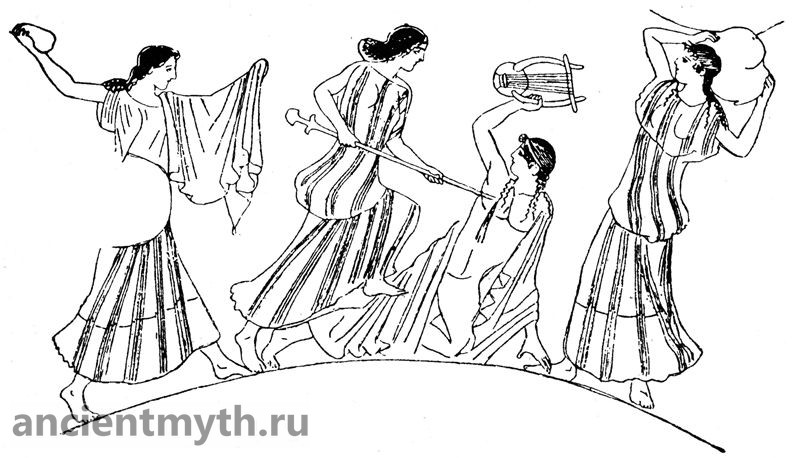Death of Orpheus
Four years have passed since death Eurydice, but remained as faithful to her Orpheus. He did not want to marry any woman in Thrace. One day in early spring, when the first greenery was breaking through on the trees, a great singer was sitting on a low hill. At his feet lay his golden kithara. The singer picked it up, softly struck the strings and sang. All nature listened to the wonderful singing. Such power sounded in the song of Orpheus, so it conquered and attracted to the singer that wild animals crowded around him, as if enchanted, who had left the surrounding forests and mountains. The birds flocked to listen to the singer. Even the trees moved and surrounded Orpheus; oak and poplar, slender cypresses and broad-leaved plane trees, pines and firs crowded around and listened to the singer; not a single branch, not a single leaf trembled on them. All nature seemed enchanted by the wondrous singing and sounds of Orpheus' kithara. Suddenly there were loud shouts in the distance, the ringing of tympanums and laughter. It was the Kikonian women who celebrated the merry feast of Dionysus. The bacchantes are getting closer, they saw Orpheus, and one of them exclaimed loudly:
- Here he is, a hater of women!

(Drawing on a vase)
The bacchante waved her thyrsus and threw it at Orpheus. But the ivy twining around the thyrsus protected the singer. Another bacchante threw a stone at Orpheus, but the stone, defeated by the enchanting singing, fell at Orpheus' feet, as if begging for forgiveness. The cries of the bacchantes rang louder and louder around the singer, the songs sounded louder, and the tympanums thundered louder. The noise of the Dionysus festival drowned out the singer. The bacchantes surrounded Orpheus, swooping down on him like a flock of birds of prey. A hail of thyrses and stones flew at the singer. Orpheus pleads in vain for mercy, but the frantic bacchantes will not listen to him, whose voice the trees and rocks obeyed. Stained with blood, Orpheus fell to the ground, his soul flew away, and the bacchantes tore his body with their bloody hands. Orpheus' head and his kithara were thrown by bacchantes into the fast waters of the river Gebra. And-oh, a miracle! - the strings of the kithara, carried away by the waves of the river, sound softly, as if they complain about the death of the singer, and the shore answers them sadly. All nature mourned Orpheus: trees and flowers wept, animals and birds wept, and even dumb rocks wept, and rivers became more abundant from the tears they shed. Nymphs and dryads, as a sign of sadness, let down their hair and put on dark clothes. Gebr carried the singer's head and kifara further and further to the wide sea, and the sea waves brought kifara to the shores Lesbos. Since then, the sounds of wonderful songs have been heard on Lesbos. The gods then placed Orpheus' golden kithara in the sky among constellations.
Orpheus' soul descended into the realm of shadows and saw again the places where Orpheus was looking for his Eurydice. The great singer met the shadow of Eurydice again and embraced her with love in his arms. From then on, they could be inseparable. The shadows of Orpheus and Eurydice wander through the gloomy fields overgrown with asphodels. Now Orpheus can turn around without fear to see if Eurydice is following him.